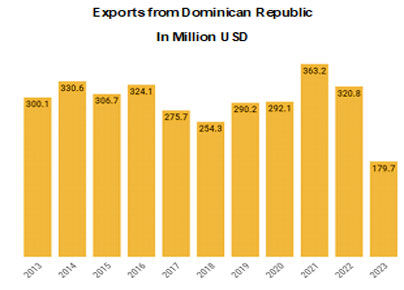Dominican Bananas Go Through a Bad Period Weather and Pests Affect Exports
2024-02-02

Sales fell 28.6% as of September 2023, and imports from the EU from the Dominican Republic are down 27%.
High temperatures and pests weighed on the performance of Dominican banana exports during 2023, an agricultural sector whose producers are still struggling to recover from the climatic ravages of eight years ago, when hurricanes Matthew, Irma and Maria flooded many of the plantations and left them in debt.
The most recent data on exports show that, as of September last year, the item reached 179.7 million dollars in sales abroad, a contraction of 28.6% compared to the third quarter of last year, according to the Central Bank. This result is only 43.7% close to the total achieved in 2022, when international markets made purchases of this item valued at 320.8 million dollars, in addition to being below the average 294 million dollars that the sector has reached annually in the last decade.
The president of the Dominican Association of Banana Producers (Adobanano), Hilario Pellegrini, said that the expectations of the total exported last year could be better.
"The end of 2023 will be close to 250 or 260 million dollars, but the trend – if low production and exports continue – would be to fall below 200 million dollars." According to data from the Ministry of Agriculture, this situation threatens the continued growth of banana production that was foreseen in the last decade, ending 2022 with 51.3 million fruit bunches.
The European Union – the primary niche market for Dominican bananas, especially organic bananas – had decreased its imports of Dominican products by 27% as of November 2023, from acquiring 243,028 tons in 2022 to 177,136, according to the Center for International Cooperation in Agricultural Research for Development (CIRAD).
Pellegrini explained that this is because all plantations nationwide – more than 340,000 hectares of land – have been severely affected by the pest Eriophyoidea, a mite that feeds on the leaf tissues of plants, deforming them and affecting their ability to produce quality fruit. It is an unprecedented impact for the sector, which did not see last year's high temperatures coming, hindering the proper oxygenation of the plants and causing an early ripening problem.
When it arrives at its destination, the deterioration of the fruit has generated complaints from buyers valued at 7 million dollars. It has reduced 450 to 190 the average number of containers loaded with bananas that were shipped weekly to Europe.
"Right now, what worries us most is (the loss) of the market," said Gustavo Gandini, coordinator of Organic Agriculture for the Banelino company, who explained that the Dominican Republic was a pioneer and leader for many years in the sale of organic bananas in the world.
As the sale of a fruit harvested without chemical residues and with environmentally friendly products has become more of a market requirement than a preferential component, producers now fear those countries with greater volume and export logistics, such as Ecuador, Colombia, Mexico, or Guatemala, will monopolise the space that Dominican bananas had conquered.
Gandini understands that state policies are needed to allow the European organic market to recover strongly or to initiate strategies to attract new markets, such as the United States.
However, this requires investing in improving the sector's productivity, with seedlings that are more resistant to climate change and pests, as well as improving land cover and the biological diversity of plantations.
The Ministry of Agriculture, the Agricultural Bank and Adobanano are working on a proposal for the Government to allocate special funds of 6,000 million pesos over two years to renew 50,000 banana tasks, maintain 200,000 jobs, and invest in research and training for the banana sector.
On this, the regional director of the northwest line for the Ministry of Agriculture, Julio César Estévez, reported that they also plan to cover other proposals within the framework of the National Banana Policy Commission – a multisectoral working group created by President Luis Abinader to give more support to the sector.
Among these, it is contemplated that the financing to producers for the acquisition of products to combat pests and diseases that are certified for the special treatment required by organic bananas will be extended, as well as a grace period of one year for those who have debts contracted or restructured through the Agricultural Bank.
So far, the Ministry of Agriculture has granted producers 70 million pesos last December to purchase fertilisers and 54 million pesos for pesticides.









